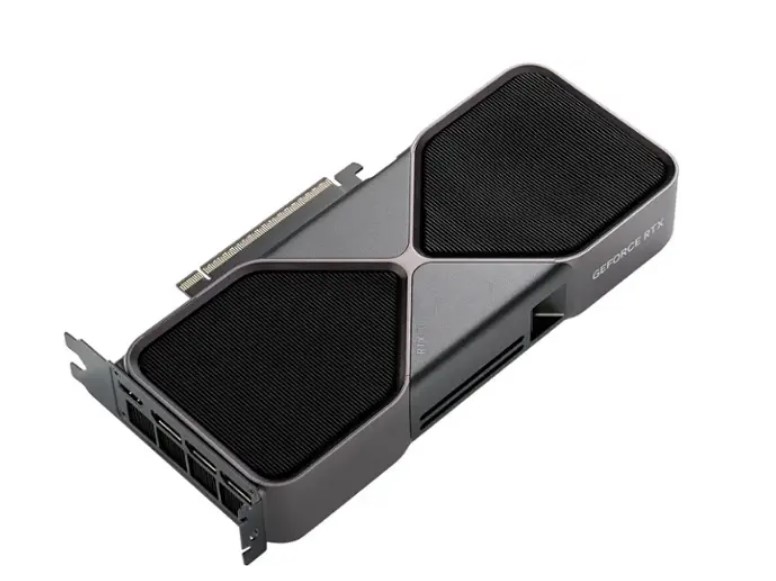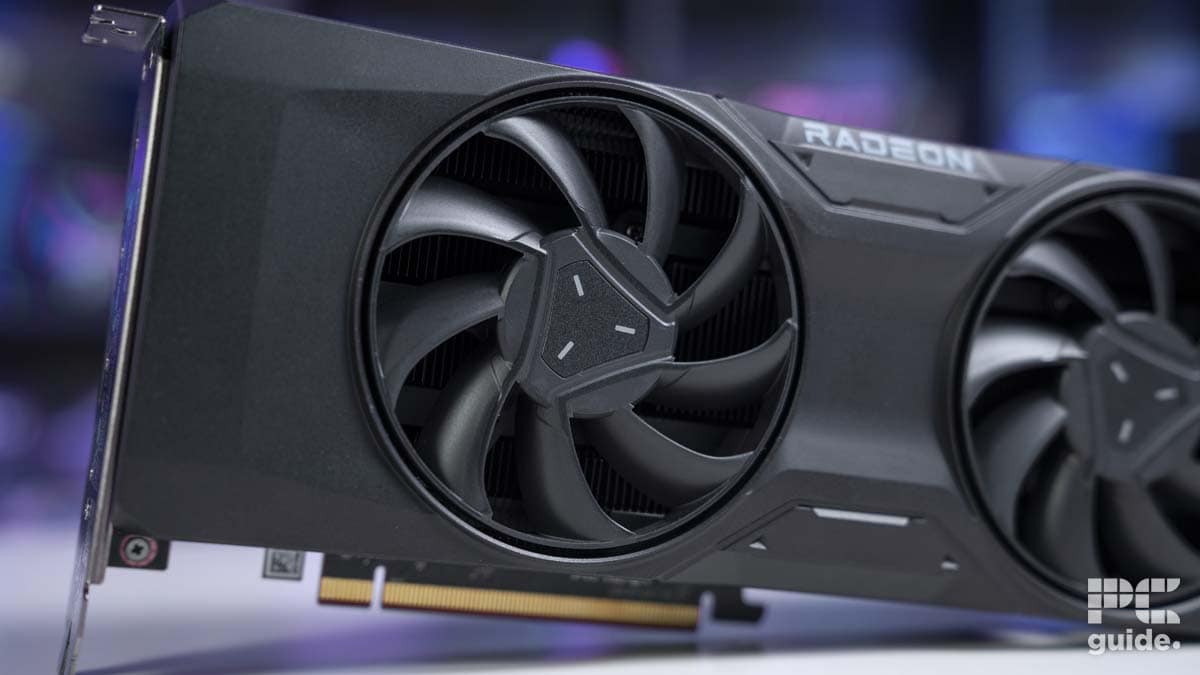RTX 5070 Ti vs RX 7800 XT comparison – which one should you go for?
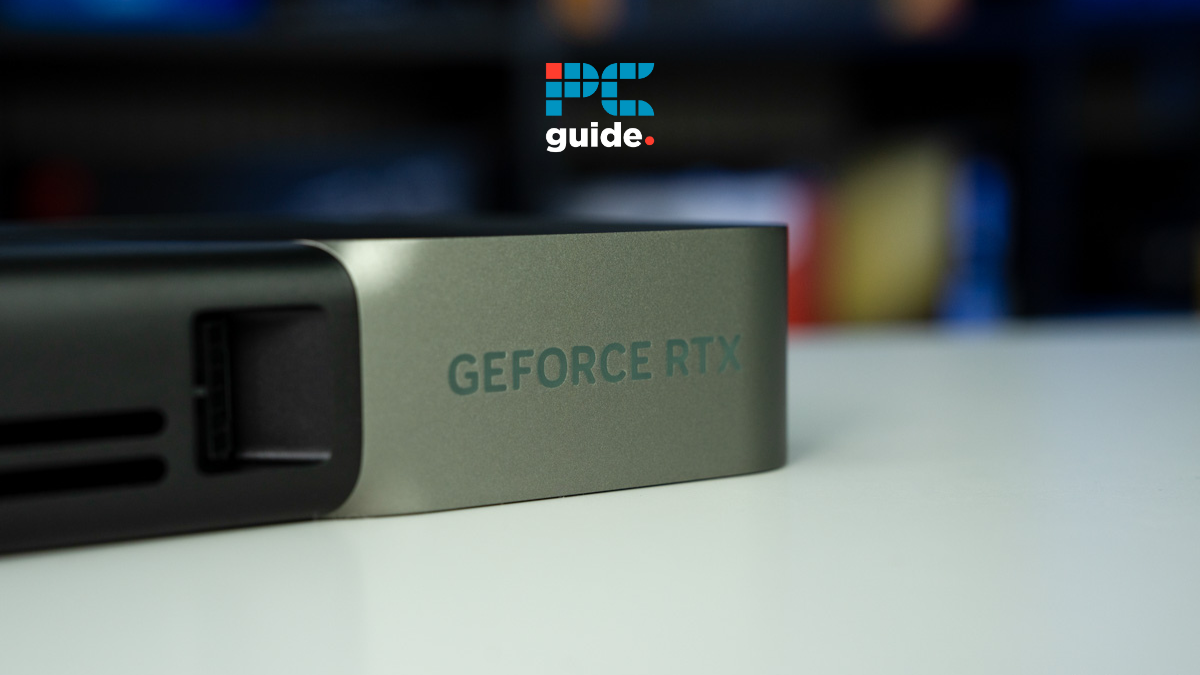
Table of Contents
The RTX 5070 Ti is finally here, and although the launch has been plagued with stock issues, reviews have been generally favorable – noting its solid performance at 1440p and good 4K performance, with the added help of DLSS 4 and MFG that is. That being said, some have been fairly outspoken about the card and why it may not be for everyone.
The big issue with the 5070 Ti is the pricing, namely the fact that it’s near impossible to find at MSRP, making its performance for the money less than what Nvidia originally pitched to us. This is a big deal, and some reviews have actually differed their ratings until the price levels out.
Prime Day is finally here! Find all the biggest tech and PC deals below.
- Sapphire 11348-03-20G Pulse AMD Radeon™ RX 9070 XT Was $779 Now $739
- AMD Ryzen 7 7800X3D 8-Core, 16-Thread Desktop Processor Was $449 Now $341
- ASUS RTX™ 5060 OC Edition Graphics Card Was $379 Now $339
- LG 77-Inch Class OLED evo AI 4K C5 Series Smart TV Was $3,696 Now $2,796
- Intel® Core™ i7-14700K New Gaming Desktop Was $320.99 Now $274
- Lexar 2TB NM1090 w/HeatSink SSD PCIe Gen5x4 NVMe M.2 Was $281.97 Now $214.98
- Apple Watch Series 10 GPS + Cellular 42mm case Smartwatch Was $499.99 Now $379.99
- ASUS ROG Strix G16 (2025) 16" FHD, RTX 5060 gaming laptop Was $1,499.99 Now $1,274.99
- Apple iPad mini (A17 Pro): Apple Intelligence Was $499.99 Now $379.99
*Prices and savings subject to change. Click through to get the current prices.
Due to the stock issues and pricing, you may be interested in exploring some of the older cards that are more readily available, and one such option is the RX 7800 XT. This AMD card boasts impressive performance and offers a solid alternative to the 5070 Ti. Here, we’ll compare the two by using various RTX 5070 Ti benchmarks, and our own RX 7800 XT testing and review. Once we get hands on with the 5070 Ti, we’ll update this page accordingly.
RTX 5070 Ti vs. RX 7800 XT specs comparison
Here’s a quick look at how these two cards stack up side-by-side.
| Specifications | RTX 5070 Ti | RX 7800 XT |
| GPU | GB203 | Navi 32 |
| Cores | 8960 | 6144 |
| Base clock speed | 2.3 GHz | 1295 MHz |
| Boost clock speed | 2.45GHZ | 1295 MHz |
| Memory | 16GB GDDR7 | 16GB GDDR6 |
| Memory interface | 256-bit | 256-bit |
| Bandwidth | 896 GB/sec | 624.1 GB/s |
| TDP | 300W | 263W |
| Power connector | 2x PCIe 8-pin cables or 300 W or greater PCIe Gen 5 cable | 2x 8-pin power connectors |
| Release date | February 2025 | August 2023 |
Performance comparison
We'll compare the RTX 5070 Ti and the RX 7800 XT, as we've reviewed the latter in-house and have access to its full gaming and synthetic performance benchmarks. There are plenty of reviews online for the RTX 5070 Ti, which we'll use for the time being to draw a comparison. We will update this article once we've put it through its paces in our testing lab.
RTX 5070 Ti vs. RX 7800 XT 4K performance
When it comes to which card out of the two would be better for 4K gaming, the quick answer is that the odds in the RTX 5070 Ti's favor delivering better performance due to the AI improvements and newer hardware.
We've also seen it outperforming the 7800 XT at 4K in various titles. We've reviewed the RX 7800 XT, and in one of the most graphically demanding titles, Cyberpunk 2077, it managed 39 FPS, while in one of the online reviews, the RTX 5070 Ti paired with the 9800X3D delivered 67 FPS (52% better performance).
If you think that being paired with the currently best gaming processor would make a difference, honestly, it would, but not such a significant one, and at higher resolutions, it’s all about the graphics card rather than the CPU. So, the RTX 5070 Ti is simply just better.
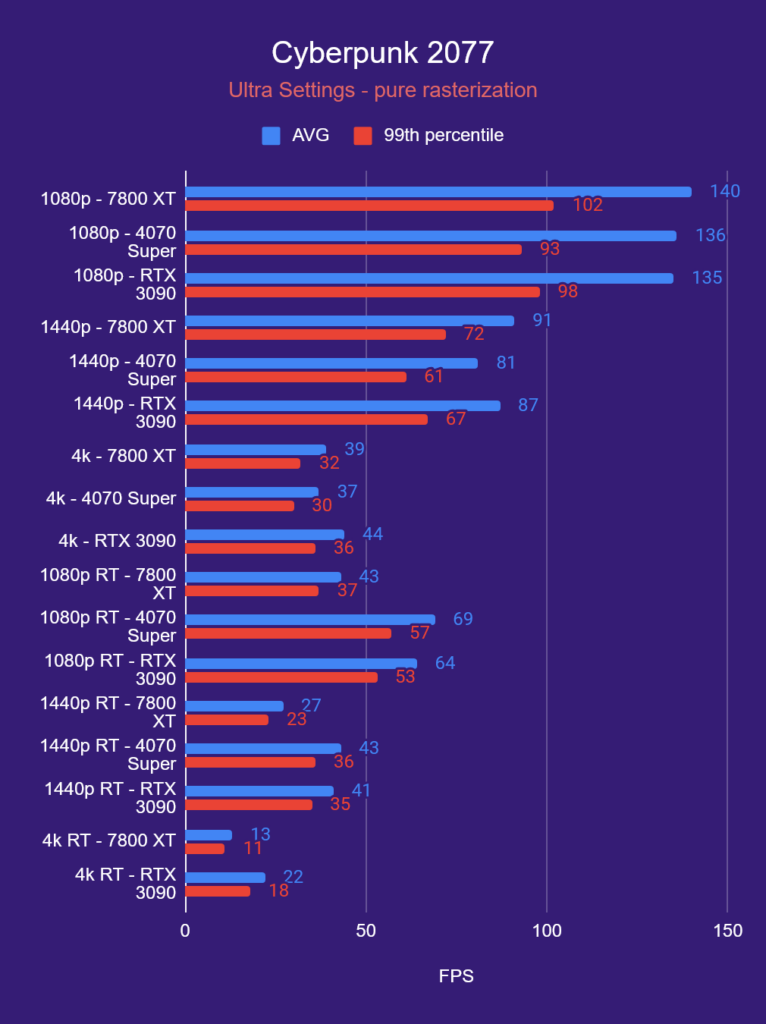
Besides that, we'll take the example of CS2, God of War: Ragnarok, and Hogwarts Legacy. In Counter-Strike 2, the RX 7800 XT managed 114 FPS while the 5070 Ti blew past it with 332 FPS. This is a massive 97% performance difference, and no amount of AI upscaling can help the 7800 XT bridge this gap.
GoW: Ragnarok ran with 67 FPS while the RTX 5070 Ti crossed the 100 FPS mark with 108 FPS, meaning it had 46% better output in this title. Lastly, we've got Hogwarts Legacy, a title that made waves upon its release to give even the RTX 4090 a difficult time. The RX 7800 XT managed to run this title with 61 FPS, and the 5070 Ti delivered 20 more frames with 81 FPS(28% performance difference).
While the RX 7800 XT can also push 4K in some titles, we found that it isn't the best card because it is a mid-range GPU and has its limitations. However, when it comes to the RTX 5070 Ti, boasting the new Blackwell architecture and GDDR7 memory type, it had a much easier time rendering 4K frames even though both graphics cards were operating with a 16GB VRAM.
RTX 5070 Ti vs. RX 7800 XT 1440p performance
The RX 7800 XT's sweet spot is 1440p gaming, but let’s see if it'll be enough to compete with the RTX 5070 Ti. We'll take the numbers of the same four titles and give you a percentage difference so you can draw a clear comparison.
In Cyberpunk 2077, the RTX 5070 Ti delivered 124 FPS at 2K, while the RX 7800 XT managed 91 FPS (a 30% performance difference). We can see that the percentage difference dropped from 52% to 30% in the 7800 XT's favor at 1440p, and while there is still a significant difference, we can't deny that Team Red's mid-range offering did pretty well at 1440p.
In Counter-Strike 2, the RX 7800 XT delivered 244 FPS while the Nvidia's mid-range GPU dominated it with 479 FPS. While even 244 FPS is great, the 5070 Ti had 65% better performance.
Regarding the gaming performance in GoW: Ragnarok and Hogwarts Legacy, the RTX 5070 Ti managed 161 and 125 FPS, respectively, while the 7800 XT delivered 111 and 118 FPS in the same titles. There is only a 7 FPS difference in Hogwarts Legacy, but in GoW: Ragnarok, the 5070 Ti gave a 36% better performance.
So, while the RX 7800 XT did well to reduce the performance gap between it and the RTX 5070 Ti, ultimately, the latter had much better performance, and with DLSS 4 being part of the equation, there is little to no hope for the 7800 XT to go toe-to-toe with it.
RTX 5070 Ti vs. RX 7800 XT synthetic performance
In our RX 7800 XT review, we found that this GPU isn't the best for creatives, but we'll compare its synthetic performance with that of the RTX 5070 Ti to see how far apart they are. We'll take the example of 3DMark and, specifically, Time Spy Extreme and Port Royal.
We'll focus on these tests because the first gauges the graphics card's ability to render 4K frames while the latter focuses on its Ray Tracing performance. The RX 7800 XT managed 9,080 points in Time Spy Extreme, while the 5070 Ti had a much easier time and got 13,550 points.
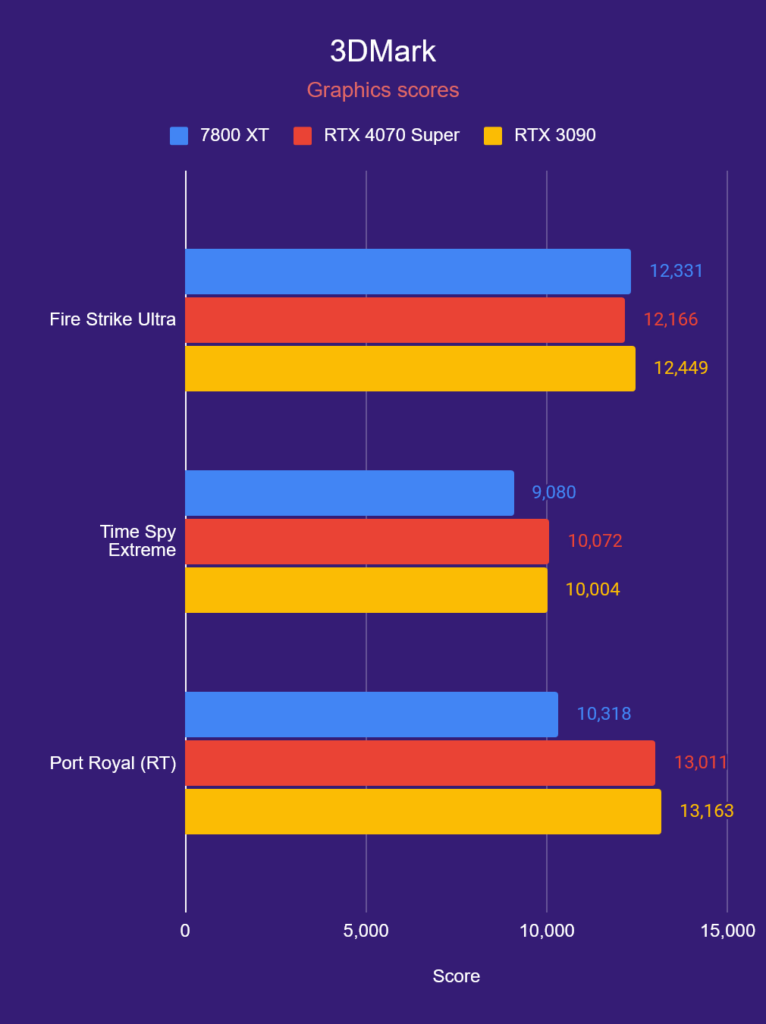
In Port Royal, the AMD GPU got 10,318 points, which paled compared to the 5070 Ti's 19,254 points. What this means is that when it comes to synthetic performance and professional workflows, the RTX 5070 Ti is the better option.
Design differences
Now that we've seen how these graphics cards are different in terms of performance, we'll explore other aspects, such as the size and memory bus width. We won't go into the details about why we aren't comparing the architecture or cores because they are highly complex and can't be directly compared. While they are cores at the end of the day, they are designed differently based on their architectures.
Memory bus width and PCIe connection
The RTX 5070 Ti has a PCIe 5.0 connection, while the RX 7800 XT has a PCIe 4.0 connection. So, the former has access to more bandwidth and speed, and more data can quickly move between the CPU, GPU, and other components compared to the RX 7800 XT.
However, that just means that more data will be readily available for the RTX 5070 Ti, and after that, the performance of the GPU depends on the memory bus width. Both of these cards have a 256-bit connection, meaning they'll process 256 bits of data each clock cycle.
Does this mean that their output would be the same? No, the memory type also comes into play, and since GDDR7 has a higher bandwidth and speed, it gives the 5070 Ti the edge in processing, and we can see that by its output.
Size
The RTX 5070 Ti is a 2-slot card that measures 242 x 112mm (L x W), and the RX 7800 XT isn't too far off as it measures 267 x 111mm (L x W). So, any PC case that can house the RX 7800 XT should also be able to accommodate the RTX 5070 Ti.
That being said, these dimensions are for reference cards, and third-party variants are always bigger. For example, the RTX 5070 Ti GAMING OC measures 340 x 140 x 70mm (LxWxH), and the RX 7800 XT GAMING OC measures 302 x 130 x 56mm(LxWxH).
As you can see, these cards are much larger than their reference cards, and being factory overclocked means they'll have better output but at the cost of more heat generation, which is why these GPUs are bulky, as more cooling solutions need to be installed to keep them cool. That being said, you can overclock your GPU by yourself and save some cash by getting a non-OC GPU.
Pricing and availability
The RTX 5070 Ti is priced at $749, which puts it in a pickle as it is very close to the RTX 5080, and we might see many opting to spend a little more and go for the RTX 5080, meaning the RTX 5070 Ti might not see a lot of sales in the long run.
That being said, the stock for the RTX 5070 Ti was cleared out within minutes at popular retail stores such as Amazon, Best Buy, and Newegg. There is no word on when the next shipment of GPUs will come, but we recommend keeping your eyes on the RTX 5070 Ti stock tracker as we regularly update it.
You still have a chance to get options like the ASUS TUF RTX 5070 Ti on Best Buy, as it seems like they haven't gone live, but the competition will be extremely tough. On the other hand, there is no shortage of the RX 7800 XT, as many variants are available across all major retailers.
We found this GIGABYTE RX 7800 XT GAMING OC for $539.99 on Best Buy and ASRock Challenger RX 7800 XT OC on Amazon for $623.14. So, regarding value for money, it seems like the RTX 5070 Ti is the better option, but only if you can get it at the MSRP. If not, the RX 7800 XT is a solid card for pure 1440p gaming, and if you have to spend more than $749.99 for an RTX 5070 Ti, you might as well go for the RTX 5080.
Verdict
Between the RTX 5070 Ti and the RX 7800 XT, the former is clearly the better card, but that isn't a surprise, given all the improvements it brings to the table. The 7800 XT did its best and tried to close the gap in the performance at 1440p but ultimately couldn't compete with the 5070 Ti head-on.
This goes for gaming and synthetic performance. There is even a great gap beyond the horizon with DLSS 4 and Multi-Frame Generation, which puts every card from AMD and even the 5070 Ti's predecessors at a massive disadvantage. While many aren't fond of the frames generated by AI upscaling, it provides a better and smoother gaming experience at the end of the day, which is undeniable.

